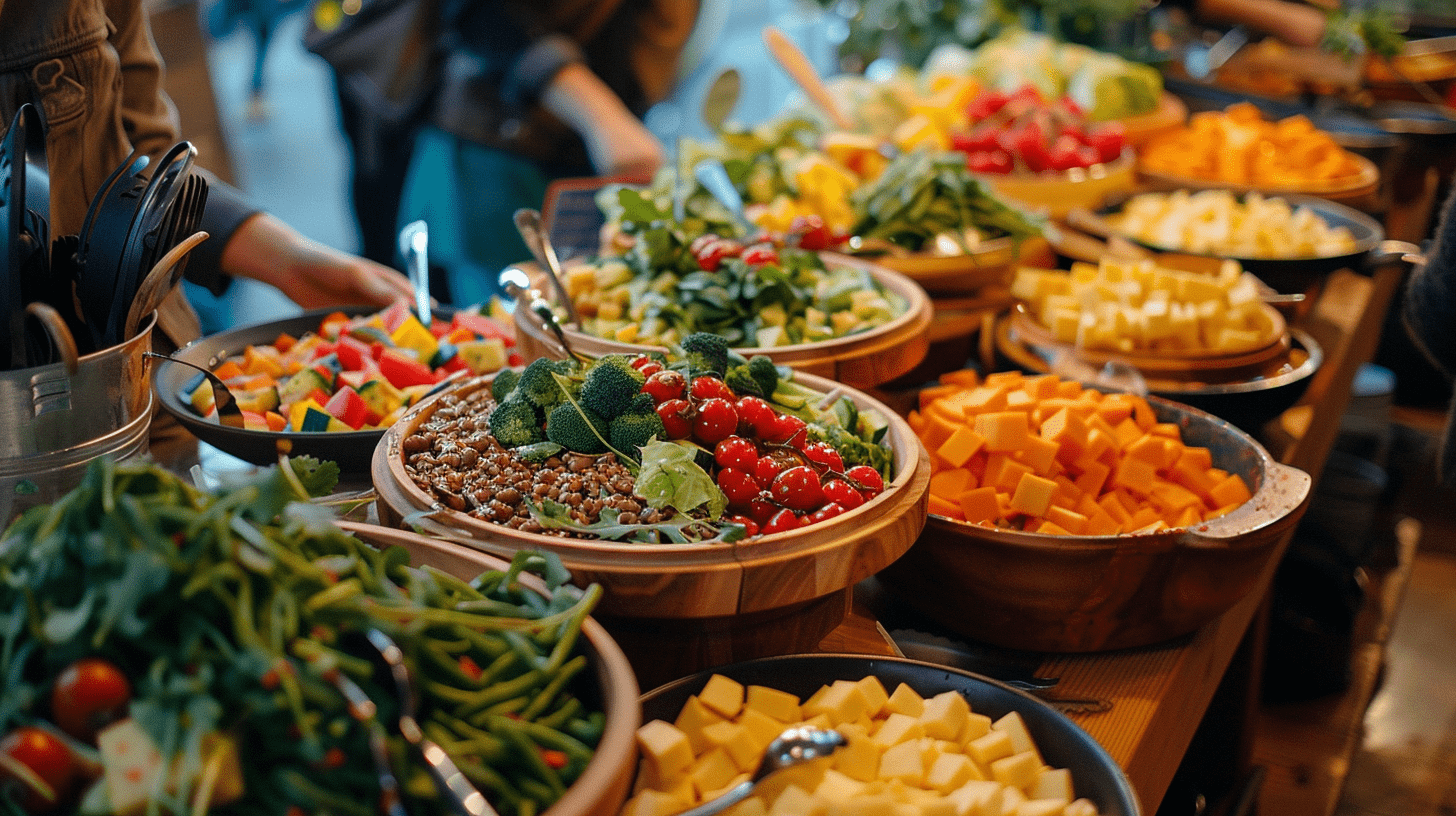WIDE BRISBANE AREA DELIVERY order from $150.
WIDE BRISBANE AREA DELIVERY order from $150.
Top Tips for Managing Dietary Requirements in Events
11 min read

Need to manage dietary requirements at your event? This guide explains common dietary needs and offers practical tips to cater to everyone safely.
Dietary - Key Takeaways
- Understanding and accommodating various dietary requirements—due to health conditions, personal choices, or religious beliefs—is crucial for enhancing the overall event experience and ensuring guest safety.
- Effective management of dietary needs involves meticulous menu planning, clear labeling, communication, and avoiding cross-contamination to prevent adverse health reactions.
- Offering diverse and inclusive food options, such as gluten-free, dairy-free, vegetarian, vegan, paleo, and FODMAP-friendly choices, ensures that all guests can enjoy their meals without compromising their dietary restrictions.
Understanding Dietary Requirements
In today’s society, marked by its multiculturalism and health consciousness, comprehending dietary requirements is of utmost importance. These requirements are the restrictions or guidelines individuals follow regarding what they can or cannot eat, which can stem from:
- health conditions
- religious beliefs
- personal principles
- personal enjoyment
Catering to these needs ensures that all attendees feel valued and welcomed, avoiding potential health risks and enhancing the overall event experience.

Given the rising prevalence of food allergies, intolerances, and the diverse cultural backgrounds of attendees, the need to be aware of dietary requirements has never been more paramount. Let’s delve deeper into the different types of dietary requirements, starting with food allergies.
Food Allergies
Food allergies are serious and can be life-threatening. A food allergy occurs when the body’s immune system reacts to certain foods, mistaking them for harmful substances and causing an allergic reaction. Some of the most common food allergies include:
- peanuts
- tree nuts
- fish
- shellfish
- eggs
- dairy products
For instance, peanut allergies are particularly severe and require strict avoidance of any peanut-containing products.
Dairy allergies, another common type, are immune reactions to proteins found in cow’s milk, such as casein and whey. Symptoms can range from mild, like bloating and skin reactions, to severe anaphylaxis, a potentially life-threatening condition. It’s crucial to understand that lactose-free products are not suitable for dairy allergies, and clear labeling is vital to prevent accidental exposure.
Shellfish allergies also pose a significant risk, requiring complete avoidance of all types of shellfish. These allergies, along with nut allergies, are among the top concerns for event planners. Proper food labeling and avoiding cross-contamination are critical steps in managing these risks.
It’s crucial to grasp the allergenicity of each ingredient incorporated in food preparation. By doing so, event planners can prevent sudden health situations and ensure a safe dining environment for all guests.
Food Intolerances
Food intolerances involve the digestive system, whereas food allergies involve the immune system. This is the primary difference between the two. These intolerances can cause discomfort and gastrointestinal symptoms such as:
- stomach pain
- gas
- bloating
- nausea
- diarrhea
These symptoms can take several hours to develop. A common example is lactose intolerance, where individuals lack the enzyme lactase needed to digest lactose, the sugar in milk.
People with lactose intolerance can manage their condition by consuming lactose-free dairy products or plant-based milk alternatives. Another example is non-celiac gluten sensitivity, which causes symptoms similar to celiac disease without being an allergic or autoimmune condition. Getting to grips with these intolerances aids in menu planning that circumvents causing discomfort and guarantees a comfortable dining experience for all participants.
Special Diets
Special diets often arise from personal principles, ethical beliefs, or religious practices. For instance, a vegetarian diet excludes meat but may include animal by-products like eggs and cheese. There are various types of vegetarianism: lacto-vegetarian (includes dairy), ovo-vegetarian (includes eggs), and lacto-ovo-vegetarian (includes both). Vegetarians need a variety of plant-based protein sources to maintain adequate nutrition.
Veganism takes it a step further by eliminating all animal products, including:
- meat
- dairy
- eggs
- gelatin
- honey
Vegans avoid all animal-derived ingredients for ethical, environmental, or health reasons. Providing vegan-friendly options at events is crucial for inclusivity.
Religious dietary laws also influence food choices. Kosher dietary laws, followed in Jewish tradition, prohibit certain foods and require the separation of meat and dairy. Similarly, halal dietary requirements, based on Islamic law, restrict pork and alcohol and mandate specific methods of animal slaughter. Understanding these special diets ensures that all attendees, regardless of their dietary practices, can enjoy the event.
Common Dietary Requirements
Navigating the maze of dietary requirements can be daunting, but focusing on the most common ones can simplify the process. The most frequent dietary requirements include:
- Gluten-free
- Dairy-free
- Vegetarian
- Vegan
- Paleo
- FODMAP
Each of these special dietary plans has unique restrictions and requires specific alternatives to ensure that attendees can enjoy their meals without worry.
For event organizers, it’s paramount to comprehend these common dietary requirements. By offering suitable alternatives and substitutes, you can cater to a diverse audience and make everyone feel included. Let’s explore each of these diets in detail.
Gluten-Free Diet
A gluten-free diet is essential for individuals with celiac disease, gluten intolerance, or non-celiac gluten sensitivity. Gluten, a mixture of proteins found in wheat, barley, and rye, is what gives bread its elasticity and pasta its chewiness. However, for those with gluten-related disorders, consuming gluten can lead to severe health issues.

Foods that contain gluten include bread, cakes, cookies, pastries, beer, sauces, and soups. When catering for gluten-free individuals, it’s important to avoid these gluten-containing foods and offer alternatives like rice, corn, quinoa, buckwheat, and gluten-free flours such as almond and coconut flour. Gluten-free pasta alternatives include those made from corn or rice flour, chickpeas, and red lentils.
Suitable gluten-free grains include:
- amaranth
- arrowroot
- buckwheat
- corn
- flax
- millet
- quinoa
- rice
- sorghum
- soy
- tapioca
- teff
For beverages, gluten-free beer options like those from Peroni ensure that everyone can enjoy a drink safely. Providing a variety of naturally gluten-free foods, such as fruits, vegetables, beans, seeds, legumes, nuts, eggs, lean meats, fish, poultry, and most low-fat dairy products, ensures a balanced and inclusive menu.
Making sure gluten-free options are readily available and clearly marked is vital for your guests’ safety and enjoyment. This not only demonstrates your commitment to inclusivity but also helps prevent any accidental consumption of gluten.
Dairy-Free Diet
A dairy-free diet excludes all dairy products, including:
- cheese
- yogurt
- cream
- butter
This diet is essential for individuals with lactose intolerance or dairy allergies. Lactose intolerance, where the body cannot digest lactose, can cause digestive discomfort, while dairy allergies can trigger severe allergic reactions.

Dairy-free alternatives include plant-based milks such as almond milk, soy milk, coconut milk, and dairy-free cheeses and yogurts. These substitutes ensure that those with dairy restrictions can enjoy a variety of foods without compromising their health. It’s also important to check ingredient lists for hidden dairy in items like gravies, sauces, and even some potato crisps.
When offering dairy-free options, it’s necessary to ensure an adequate intake of nutrients like calcium, vitamin D, and vitamin B12 from other sources. By offering a range of dairy-free alternatives, you cater to the needs of those with dairy restrictions and enhance the inclusivity of your event. Some dairy-free alternatives to consider include:
- Almond milk
- Soy milk
- Coconut milk
- Oat milk
- Rice milk
- Cashew milk
These alternatives can be used in various recipes and can be enjoyed on their own as well.
Vegetarian Diet
A vegetarian diet excludes meat but may include animal by-products like eggs and cheese. There are several variations of vegetarianism: lacto-vegetarian (includes dairy), ovo-vegetarian (includes eggs), and lacto-ovo-vegetarian (includes both). Catering to vegetarians requires a focus on plant-based foods and ethically sourced animal products.
Vegetarians need a variety of plant-based protein sources to ensure adequate nutrition. Including options like legumes, tofu, and dairy products ensures that vegetarian attendees have a balanced and satisfying meal. Offering great vegetarian options benefits all guests, not just those following vegetarian diets.
Vegan Diet

A vegan diet excludes all animal products and by-products, including:
- meat
- dairy
- eggs
- gelatin
- fish-derived sauces
- honey
- whey
Vegans avoid all animal-derived ingredients for ethical, environmental, or health reasons. Providing vegan-friendly options at events is crucial to ensure inclusivity.
Common ingredients in vegan cooking include:
- mushrooms
- eggplant
- sweet potatoes
- avocados
- tofu
- tempeh
- nuts
- lentils
These foods are not only nutritious but also versatile, allowing for a variety of delicious dishes. Plant-based meats like Beyond Meat are popular meat substitutes that cater to both vegan and gluten-free diets.
Vegans should focus on a varied diet to meet their nutritional needs, including fortified foods for vitamin B12. By offering a range of vegan options, you ensure that vegan attendees can enjoy their meals without compromising their dietary principles.
Paleo Diet
The paleo diet is based on eating habits from the Paleolithic Era, focusing on foods that could be hunted or gathered. This diet includes:
- fruits
- vegetables
- meat
- seafood
- nuts
- seeds
- unrefined fats
It excludes processed foods, focusing on unprocessed foods, while also avoiding grains and dairy.
The paleo diet aims to steer clear of processed foods containing refined oils and sugars, as these have been associated with chronic diseases such as cancer and heart disease. By following this diet, individuals can reduce their risk of developing these serious health conditions. By focusing on unprocessed, nutrient-dense foods, the paleo diet promotes overall health and well-being.
Catering to paleo dieters involves offering foods like grass-fed meats, seafood, and a variety of fruits and vegetables.
FODMAP Diet
The FODMAP diet is specifically created to assist individuals with irritable bowel syndrome (IBS) and other digestive disorders in managing their symptoms. This is achieved by eliminating certain carbohydrates from their diet. FODMAP stands for:
- Fermentable oligosaccharides
- Disaccharides
- Monosaccharides
- Polyols
These are short-chain carbohydrates that can cause digestive discomfort.
A low FODMAP diet involves avoiding foods high in these carbohydrates and opting for low FODMAP alternatives like:
- bananas
- carrots
- potatoes
- gluten-free grains
This diet requires careful planning and adherence to specific food requirements, making it challenging to cater for.
Customized meal plans based on individual tolerances are essential for those following a strict FODMAP diet. By understanding and accommodating these needs, you can provide a safe and enjoyable dining experience for all attendees.
Catering for Specific Dietary Needs
Successfully catering for specific dietary needs demands meticulous planning and execution. It’s crucial to consider dietary restrictions to prevent serious health risks and make all attendees feel included. By understanding and accommodating various dietary requirements, event planners can ensure a delightful and safe dining experience for everyone.
Effective management of dietary requirements involves pre-event surveys, clear communication, and proper food labeling. These steps help cater to diverse dietary needs and minimize the risk of adverse reactions.
Menu Planning
Menu planning is a critical aspect of catering for specific dietary needs. Offering a variety of foods helps cater to different dietary requirements without isolating any guests. It’s essential to include great vegetarian or vegan options to accommodate those with specific food customs and laws.
Having vegetarian options on any menu is not just about catering to vegetarians; it also provides more choices for all customers, enhancing their dining experience. A meticulously planned menu guarantees that everyone finds something that is both delicious and suitable for their dietary needs.
Avoid Cross Contamination
Avoiding cross-contamination is paramount when catering for guests with food allergies or intolerances. It is crucial to handle allergens with care to prevent cross-contact, which can lead to severe allergic reactions. To avoid contamination, it’s vital to extensively clean and sanitize all food equipment and surfaces.

Being vigilant about cross-contamination involves labeling foods clearly and communicating effectively with caterers and staff. These precautions help create a safe dining environment for all attendees, ensuring that no one is exposed to allergens inadvertently.
Labeling and Communication
Clear labeling and effective communication are critical in managing dietary requirements at events. Food label transparency is crucial—listing all potential allergens, including in colorings, flavors, and additives, helps attendees make informed choices.
Effective communication with caterers and attendees about dietary restrictions ensures that everyone is aware of the available options and any potential risks. This proactive approach fosters trust and inclusivity, making the event enjoyable for all.
Popular Alternatives and Substitutes
Offering favored alternatives and substitutes for common dietary requirements is key to guarantee a diverse and enjoyable dining experience for all participants. Gluten-free grains, plant-based milks, and meat substitutes are among the top choices that cater to various dietary needs.
Incorporating these alternatives into your menu not only meets dietary requirements but also showcases your commitment to inclusivity and culinary creativity. Let’s explore some common substitutes in more detail.
Gluten-Free Alternatives
Gluten-free alternatives include:
- Grains like quinoa and millet, which serve as common substitutes for wheat products
- Buckwheat, despite its name, is gluten-free and can replace traditional wheat in various recipes
- Rice noodles and 100% buckwheat noodles are suitable gluten-free alternatives for traditional wheat-based noodles.
Providing gluten-free alternatives is essential for catering to guests with gluten intolerance or celiac disease, ensuring they have safe and enjoyable meal options. Some gluten-free alternatives to consider include:
- Gluten-free bread and pasta
- Gluten-free flour for baking
- Gluten-free oats
- Gluten-free sauces and condiments
- Gluten-free snacks and desserts
In addition, gluten-free soy sauce is also widely available, making it easier to accommodate gluten-free diets.
Dairy-Free Substitutes
Dairy-free substitutes include plant-based milks like almond milk, soy milk, rice milk, and oat milk, offering lactose-free and dairy-free options for those with dairy allergies or intolerances. Dairy-free cheeses, often made from nuts such as cashews or based on oils, are available for those avoiding dairy.
Coconut yogurt is a common dairy-free alternative to traditional yogurt. Using these substitutes is essential in meal planning to ensure that individuals with dairy restrictions can enjoy a variety of foods without compromising their health.
Meat Alternatives
Meat alternatives like tempeh, made from fermented soybeans, are popular in vegetarian and vegan diets due to their high:
- protein
- iron
- calcium
- vitamin B12 content
Event planners should consider tempeh as a key meat alternative to provide nutritious and satisfying options.
Legumes like lentils and chickpeas are excellent meat substitutes, offering high protein content and versatility in cooking. Including legumes in event menus helps ensure a nutritious option for vegetarians and vegans, meeting their protein needs.
Imitation meats are also available, providing protein substitutes that mimic the texture and taste of traditional meats.
Health Benefits of Accommodating Dietary Requirements
Accommodating diverse dietary requirements at gatherings can avert unfavorable reactions and foster inclusivity. Providing gluten-free options can prevent digestive issues and nutritional deficiencies for individuals with gluten intolerance. By offering diverse dietary options, event planners can ensure that all attendees feel included and their health needs are met.
Accommodating dietary requirements not only enhances the dining experience but also underscores the event’s commitment to health and well-being. Let’s delve into the specific health benefits of catering to different dietary needs.
Balanced Diet
A balanced diet, integral for overall health, incorporates healthy fats, lean proteins, and non-starchy vegetables. The Mediterranean diet is renowned for its heart-healthy benefits. It involves consuming a high amount of plant-based foods, whole grains, and healthy fats, which are among the best eat foods for maintaining good health.

Using the Mediterranean diet as a model can help ensure the inclusion of essential components of a balanced diet. By offering a variety of nutritious foods, event planners can promote the health benefits associated with a well-rounded diet.
Reducing Health Risks
At events, catering to particular dietary requirements can contribute to a reduction in the risk of chronic health conditions, thereby offering health benefits to attendees. Low-sodium diets, for example, help manage high blood pressure and heart disease. A sugar-free diet can aid in managing diabetes and reducing processed food intake.
By offering dietary options that cater to these needs, event planners can contribute to the overall health and well-being of their guests. This proactive approach not only enhances the dining experience but also demonstrates a commitment to promoting healthy lifestyles.
Summary
In conclusion, understanding and managing dietary requirements at events is essential for creating an inclusive and enjoyable experience for all attendees. By being aware of food allergies, intolerances, and special diets, event planners can cater to diverse needs and prevent adverse reactions.
Offering a variety of alternatives and substitutes, such as gluten-free grains, plant-based milks, and meat substitutes, ensures that everyone can enjoy a satisfying meal. Accommodating these dietary requirements not only enhances the dining experience but also promotes health and well-being. Let’s make every event a celebration of diversity and inclusivity.
Frequently Asked Questions
What are the most common food allergies to be aware of when planning an event?
When planning an event, be aware of common food allergies such as peanuts, tree nuts, fish, shellfish, eggs, and dairy products. It's important to cater to these allergies to ensure the safety of all attendees.
How can I avoid cross-contamination when preparing food for guests with allergies?
To avoid cross-contamination when preparing food for guests with allergies, it's essential to thoroughly clean and sanitize all food equipment and surfaces, handle allergens with care, and clearly label foods.
What are some suitable gluten-free alternatives for wheat-based products?
Some suitable gluten-free alternatives for wheat-based products are quinoa, millet, buckwheat, rice noodles, and gluten-free flours like almond and coconut flour. These options can be used in a variety of recipes to accommodate a gluten-free diet.
Why is it important to provide dairy-free options at events?
It is important to provide dairy-free options at events to accommodate individuals with lactose intolerance or dairy allergies, preventing digestive discomfort and severe allergic reactions.
What are some popular meat alternatives for vegetarian and vegan diets?
Some popular meat alternatives for vegetarian and vegan diets are tempeh, legumes like lentils and chickpeas, tofu, and imitation meats like. These options provide a variety of protein sources for a balanced diet.
Annie Nguyen
Annie is the Content Copywriter for Mr T’s Bakery. We make Brisbane business catering easy. With endless variety, exciting menus and an easy to use online platform, keep everyone on track with great food! Placing orders online just in minutes.
Leave a comment
Comments will be approved before showing up.
Also in Knowledge
Catering Menu With Deliveries
Delivery Locations
Recent Articles
- Top Tips for Managing Dietary Requirements in Events
- Top 10 Tips on How to Increase Productivity in the Workplace
- How to Host Australia's Biggest Morning Tea This Year
- Best Healthy Vegan Snack Ideas for Every Craving
- Watermelon - The Best Fruit Choice for Your Seasonal Health?
- Ultimate 21st Birthday Party Idea Guide: Celebrate with Style & Unforgettable Fun
- 30 Nutritious and Delicious Healthy Snack for Work Ideas
- 15+ Delicious Morning Tea Ideas for Work to Energize Your Team
- Top 10 Catering Trends Shaping Events in 2026
- Top 5 Breakfast Catering Ideas to Impress Your Meeting
Subscribe
Sign up to get the latest on sales, new releases and more …



